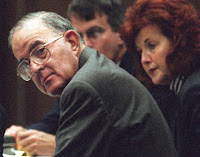Dr. Dave Gibson wrote an article in American Surveyor regarding "professionalism" and the educational component. First, let me set the context of Gibson's perspective. He is the Founding Surveying and Mapping Program Director at the University of Florida. What might come of his job if enrollment were to fall? Just to be fair, I am the Surveying/Mapping Science Program Facilitator (we don't have directors) at Santiago Canyon College in Orange, California. So, it is safe to say, I have at least a part-time job riding on the success of my program's enrollment.
Back to his article. Gibson begins with:
The image of land surveying as a technician/trade image is increasingly growing. I make a case for moving away from the apprenticeship system toward an educational standard.
It seems those of us attempting to recruit new life have succeeded in our public awareness campaigns, at least to some degree. But why does he want to move away from the traditional career path to the exclusivity of a formal education? I think I already answered that, but let's look further into Gibson's argument.
Dr. Gibson brings up again (
I wrote about this HERE) a Florida Supreme Court ruling regarding the statute of limitations for certain professions. As noted in my previous post, Gibson is trying to have us believe that a four-year degree is the defining standard of a profession simply because a state supreme court created a definition that was consistent with Florida statutes for the singular purpose of determining the statute of limitations. With that logic, only those with 4-year degrees are professional artists. And as a point of humor, even the following university majors are professionals: American Studies, Business Administration, Communications, and Reading. Further, most of those that the rest of us consider to be professional athletes, are, by Gibson's definition, not professionals at all. I have yet to find a university with a degree in boxing, but I digress.
From my previous post on Gibson's assertions regarding the Florida case, I wrote:
If education were a pyramid, kindergarten (funny we have never adopted the English term – “child garden”) through the 8th grade would be the bottom. That base creates a good, wide, solid foundation from which a person can grow intellectually. High school is a bit further up – not the top, but getting there. Mixed in is experience. Experience refines the basis into a pointed, focused body of knowledge. Depending on a person’s personality, means, and life choices, he or she might choose no college, trade school, some college, a university, or any combination of advanced education which will surely be supplemented by quality experiences from various sources and activities. Does the lack of a conferred degree detract from their professionalism? I think not.
Dr. Gibson goes on in his latest article to say:
A true learned professional must understand the mathematical, scientific, legal, environmental and societal framework within which the work takes place, speak confidently, write authoritatively, research published information and analyze related issues, skills that are beyond the realm of most "on the job" training or apprenticeship programs.
I agree with the opinion that the list of skills he gives are generally beyond the scope of on-the-job-training. However, several of the skills such as math, science, speech, and writing can and should be mastered in high school. What is not mastered in high school can easily be found and learned in a community college. The list of skills given do not lend themselves exclusively to institutions of higher learning. With that understanding, the land surveying student/apprentice needs to seek out source of information for the fringe elements of our profession that are not necessarily part of their day-to-day practice but will need to have some level of understanding for licensing exams. One example is
photogrammetry, which in California, is not regulated except in that the subject is part of the state-specific examination.

Apparently, dazzling students with brilliance takes a back seat to baffling them with bullshit (sorry Mom). Gibson says the words land surveyor conjures up the wrong image to high school students because they have a preconceived notion as to what a land surveyor is. Instead, Gibson prefers "
geomatics engineer." A rose by any other name is still a rose and a turd by any other name still stinks.
The real problem Dr. Gibson has seems to be the ignorant and uneducated technicians of Florida. Yes, California has its share of unqualified technicians who will soon be out of a job, but whether or not all 50 states adopt a mandatory 4-year degree requirement for licensure will not change those status or quality of technicians. You will always have a need for a field technician who does not command the same salary structure as the licensed professional. Gibson digs his heels in on this issue:
Firms have been forced to start drug-testing policies for their employees hired off the street, etc. Many of our current professional leaders (owners of leadership firms, chapter/society leaders, Board members, national society leaders) were trained by apprenticeship 30/40/50 years ago. They naturally think, "If I did it, someone else can." We all know and respect many professionals who did not go to college. But the 99 non-diamonds will determine the reputation, image, and future professional standing of surveying, not the one diamond.
I do not have a 4-year degree in land surveying but did attend all of the community college courses I could enroll in before taking and passing the California professional land surveying exams at age 34. In fact, the vast majority of the California licensed professional land surveyors I have
met gained licensure via the same path as I. And so, yes, I would agree that "if I did it, so can someone else."
Gibson goes on to talk about peoples' narrow "comfort zone":
An apprenticed surveyor who learned on the job may have a narrow "comfort zone" of practice--only doing those things in the manner they were taught. Such a person may be extremely uncomfortable in today's surveying world of new methods, new applications, and new tools, preferring to offer traditional services with traditional methods. When the profession in general is slow to react and embrace new technologies such as aerial mapping, GIS, etc., the door opens for competing groups to enter the field of surveying and mapping.
His first sentence takes a GIANT leap in assumptions. Surely he doesn't actually believe that educated people have a broad comfort zone over uneducated people. Surely, he is not THAT prejudice. In California, we address Gibson's concern over a licensees "comfort zone" by codifying in state law that licensees may only practice in their area of competence. To do otherwise is negligent and reckless. As to his last sentence, is he referring to civil engineers playing surveyor?
As a final though to Dr. Gibson's article, he is not completely off base, though I think he is grasping at straws. As professionals, we do need to promote education whenever and wherever we can. However, we should not use fear mongering and personal prejudice in order to elevate our profession. Lead by example.
 In yesterday's Op-Ed, The OC Register's editorial staff said, "... his brief in opposition to the board lawsuit called it 'radical.'" Yes, our own Attorney General will not defend tax payers. As the OCR points out:
In yesterday's Op-Ed, The OC Register's editorial staff said, "... his brief in opposition to the board lawsuit called it 'radical.'" Yes, our own Attorney General will not defend tax payers. As the OCR points out:














